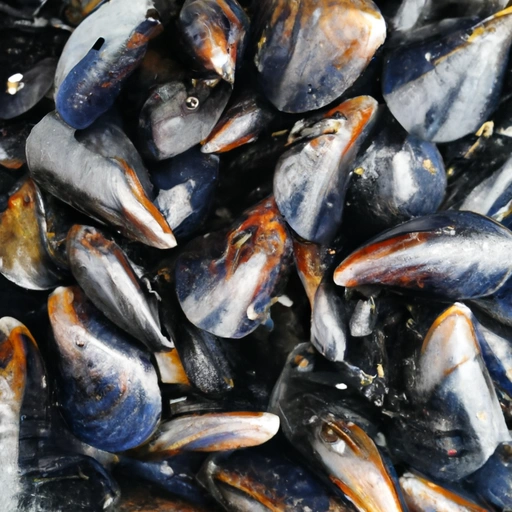Mussel
Description

Mussels are a type of shellfish that belong to the family Mytilidae. Known for their distinctive blue-black shells, these marine bivalves are harvested for their tender and flavorful meat. Mussels are a staple in seafood cuisines around the globe and are enjoyed for their versatility in various dishes. They can be found in coastal waters of many continents, including Europe, North America, and Asia, making them an accessible ingredient for a plethora of culinary traditions.
Common uses
Mussels are commonly used in a variety of dishes such as soups, stews, pasta, and paella. They are also served steamed, boiled, or baked, often accompanied by a flavorful broth or sauce. Mussels can be eaten on their own as a main dish or used to enhance the flavor of other seafood recipes.
Nutritional value
Calories
A 3-ounce (85g) serving of cooked mussels provides approximately 146 calories (cal) or 611 kilojoules (kJ).
Protein
Mussels are an excellent source of protein, offering about 20 grams (g) per 3-ounce serving, which contributes to muscle growth and repair.
Fat
With around 4 grams of fat per serving, mussels are considered a low-fat seafood option. The fats present are primarily beneficial omega-3 fatty acids.
Carbohydrates
Mussels contain a minimal amount of carbohydrates, with less than 1 gram per 3-ounce serving, making them a suitable choice for low-carb diets.
Vitamins
Mussels are rich in vitamins, particularly vitamin B12, essential for nerve function and blood cell formation. They also provide vitamin C, known for its antioxidant properties.
Minerals
Mussels are an excellent source of essential minerals such as iron, necessary for healthy blood cells; manganese, important for bone health and metabolism; and selenium, crucial for thyroid function and immunity.
Health benefits
Regular consumption of mussels can contribute to heart health due to their high omega-3 content. The protein in mussels aids in muscle maintenance, while their vitamins and minerals support immune function and energy production. The presence of iron makes mussels beneficial for preventing anemia.
Potential risks
While mussels are nutritious, they can also pose health risks if not properly cooked or sourced from contaminated waters. They have the potential to accumulate toxins, heavy metals, and harmful bacteria, which can lead to foodborne illnesses. It is crucial to purchase mussels from reliable suppliers and cook them thoroughly.
Common recipes
Mussels are used in classic dishes such as the French 'moules marinières,' the Italian 'cozze al vino bianco,' and the Spanish 'mejillones a la marinera.' They are also a key ingredient in seafood chowders and risottos.
Cooking methods
Popular methods for cooking mussels include steaming, boiling, and baking. They are known for their ability to absorb flavors, which makes them ideal for cooking in broths and sauces infused with herbs, garlic, and wine.
Pairing with other ingredients
Mussels pair well with a variety of ingredients including garlic, onions, tomatoes, white wine, cream, and fresh herbs like parsley and thyme. They also complement other seafood such as shrimp, clams, and fish.
Summary
Mussels are a versatile, nutritious, and delicious ingredient widely used in culinary traditions across the globe. Their rich protein content and essential nutrients make them a healthy addition to many dishes. Whether steamed, boiled, or baked, mussels can enhance the flavors of various recipes and provide a taste of the sea to any meal. When cooked properly and sourced from clean waters, mussels are safe to eat and offer a range of health benefits, making them a favored choice among seafood aficionados.